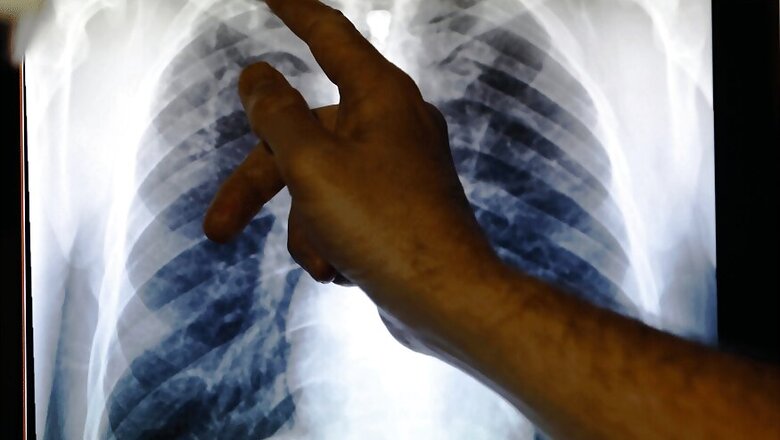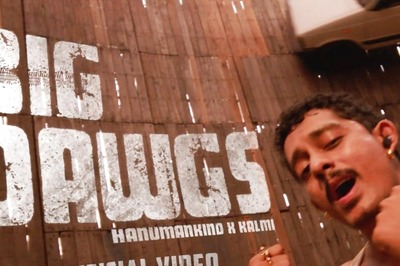
views
The centre’s grand plans for a new tuberculosis strategy are far from concrete it seems. At the World Tuberculosis Day event flush with dignitaries, Friday evening in New Delhi, the health minister CK Mishra called the much awaited new National Strategy for the Elimination of TB 2017-2025 good but “ambitious” and called for a plan B to be able to reach out to as many people as possible.
His words of caution, the only such spoken during the evening when even the WHO representative to India Dr. Hank Bekedem congratulated the centre on its achievements and promised support for future plans, were discordant with those of the health minister JP Nadda, who said the government was being “optimistic and aggressive”. Nadda did give some concession to the secretary, saying that having a plan B was stood idea.
While the draft national strategy is still being worked on -- Nadda said that the plan will be worked out in a month -- it reconfirms the government's commitment to eliminating TB by 2025, five years ahead of the 2030 global target set by the WHO. First declared by finance minister Arun Jaitley during the union budget, the target has continued to wise eyebrows in the medical community given India’s massive TB burden.
The draft also asks for four times more money, Rs 16,649 crores to implement the plan. To News18, Mishra said that money for the plan would come from the National Health Mission, calling the latter a “flexipool”. How much that will eventually be,remains to be seen.
More than the draft, Mishra exhorted all stakeholders to think differently as to how to combat TB, as old strategies would no longer work.
Mishra's point becomes all the more pertinent, as India doesn't have the logistics to achieve such an ambitious target. The World Health Organisation revealed in its Global Tuberculosis Report, released in October 2016, that India has underestimated its TB cases by nearly 7 lakh.
This when the country's flagship TB control initiative, the Revised National Tuberculosis Control Programme, or RNTCP, is plagued with systemic flaws, which are being redressed at a glacial pace, if at all.
Worryingly, India has the most cases of drug-resistant TB in the world after China, with the latest available data, for 2013, putting the number at around 248,000. The treatment of drug-resistant TB alone takes close to 40% of the annual budget for the RNTCP.
Proof that the TB control programme is floundering are three children from Faridabad, Haryana’s industrial hub bordering Delhi, who have had to return to the District Civil Hospital having contracted multi-drug resistant TB despite completing the mandated treatment regimen for simple TB. Their doctor, Raman Kakar, told News18 that they would have been cured had the central government updated its guidelines for TB treatment – to daily medication rather than three times a week – years ago instead of in January this year .
If that wasn't apathetic enough on the government's part, it for too long ignored calls from TB patients and social activists to make the patented “miracle drugs” Bedaquiline and Delamanid more accessible, preferably under the RNTCP. Both these drugs have proved effective against drug-resistant TB, which requires a minimum nine months of treatment that can extend up to two years, and have been recommended by the WHO.
India, however, has barely enough Bedaquiline to treat 300 patients. That cache, too, was donated by the USAID because the drug maker, Jannsen, the pharmaceutical division of Johnson & Johnson, has patented it and enjoys monopoly over pricing and distribution. Similarly, in the case of Delamanid, Otsuka continues to restrict access to it despite having patented the drug over eight years ago.
It was left to the courts to push India’s fight against its second most lethal infectious disease on to, what doctors and activists hope, is the right track. On 20 January, the Delhi High Court ordered the government to allow an 18-year-old girl from Patna, with extreme drug resistant TB and no time to waste, to take Bedaquiline treatment in Mumbai.
On 23 January, the Supreme Court, ruling on a petition filed by Dr Kakar in September 2016, directed the government to change the Directly Observed Treatment Short-course, or DOTS, from thrice a week medication, as started in 1997, to daily dosage.
The court rulings shone a harsh spotlight on the TB control programme's rigidity, shoddy data gathering, and sluggishness in adapting international standards, and underlined the urgent need to reform it.
India’s TB programme urgently needs to move ahead. However, the the draft strategy, at the moment, seems more grandstanding than actual forward momentum.
Dr Soumya Swaminathan, Secretary, Department of Health, and a scientist known for her work on TB, says the government has finally prioritised the control of this deadly disease. For a start, India admitted to the WHO last year that it had made a mistake in estimating TB cases at 22 lakh instead of 29 lakh, and revised up the number of TB deaths from 220,000 in 2014 to 480,000 in 2015.
India needs a “truly universal regimen”, Dr Swaminathan points out, one that builds “a thorough drug sensitivity profile of the population”. It is achievable, of course, but what has tripped up India so far are funding and bureaucratic delays. “We’re grossly underfunded,” Dr Swaminathan complains. “The five year strategic plan asked for Rs 10,000 crore, of which we got only Rs 2,500 crore. We need Rs 2500 crore annually for TB but we get Rs 700 crore.”
Not to mention, senior officials who have attended several health ministry meetings on TB, revealed that India didn’t shift to daily dosage under the DOTS programme, despite the 2010 WHO guidelines and a 2012 meeting of technical experts, because one joint secretary held the matter up for years, citing either the lack of qualified Indian drug manufacturers or procurement issues. The ministry only moved when Dr Kakar got the court to intervene.
Soon after joining the DOTS programme at Faridabad’s civil hospital, Dr Kakar noticed that something was wrong. Previously, as a private doctor, when he prescribed daily dosages to TB patients for the six-eight month duration, they would be completely cured unless, of course, they had defaulted on the regimen. At the civil hospital, however, the patients kept reappearing. After speaking to his coworkers in the DOTS unit, all of whom were unhappy with the state of affairs, he decided to track all patients under DOTS programme in Faridabad.“Unless you are part of the programme, you cannot access data. It’s locked up in government safes,” he says.
Dr Kakar lays out the math: “A new patient from, say, Nepal, who has daily DOTS, receives 450 mg of rifampicin and 1,500 mg of pyrazinamide every day, while an Indian patient gets the same only thrice a week; both get it for six to eight months. We have a truncated treatment regimen. It ruins the best chance the patients have of being completely cured the first time itself.”
In court, during the early hearings, Dr Kakar says, the government tried to save face. It claimed to have already planned a daily regimen, starting with five states in the first phase and expanding to the rest of the country by June 2018.
According to Dr Kakar, the pressures to meet targets and please superiors have compromised India’s TB related data. “DOTS unit supervisors are contract employees, with a target of 85 per cent cure rate,” he says. From experience, Dr Kakar believes that a significant number of quarterly reports from India’s 3,000 DOTS centres are fudged to show the targets have been met. “A report with a smaller cure rate is sent back with harsh words that the supervisor isn’t doing their job well,” Dr says, by way of an explanation. The reports from the centres are sent to the state TB officer, then the central health ministry and, finally, they end up in the WHO’s global TB report.
Dr Kakar lays the blame at the WHO's door at well. “They have 87 consultants in India. How did they not know India’s figures were wrong before last year’s Global Report?” he asks. “In fact, how could WHO have recommended the thrice weekly regimen in 1997 at all?”
Now, though, the good doctor can take heart from that some things seem to be rolling.
In nine months, the government is bound to introduce the daily DOTS programme, which will administer the same combination of medicines, namely Ethambutol Isoniazid Rifampicin Pyrazinamide. And in the wake of the high court ruling and criticism from health researchers and activists of the rigidity of the domicile rule, the Bedaquiline regimen will be expanded to 70 centres by end 2017 from six now.
As the government expands its Bedaquiline programme, it's being pressed by patients and public health activists – a group of activists sent the latest petition on 27 January – to bring in Delamanid as well under the RNTCP. Otsuka has not provided the medicine for compassionate use in India yet.
Then, there is the TB Consortium led by the Indian Council of Medical Research. Dr Swaminathan, who is also director general of the ICMR, says the consortium brings together government bodies, educational institutes, international agencies, private practitioners and pharma companies to fight TB in “mission mode”. It will replace the current BCG vaccine, which cannot be used for immuno-compromised patients.
Although drones carrying diagnostic kits to and from remote places – as demonstrated by scientists working in Mozambique at a press conference called by the consortium – are unlikely to be part of the TB fighting arsenal in India, advanced diagnostic technology could hit the market within a year. More important, Dr Swaminathan says, India’s version of the GeneXpert TB test is set to replace the microscopy sputum test, which is known to yield false results.
On another front, BRICS, a grouping of emerging economies of which India is a member, has signed a declaration to coordinate on TB control. But health ministry officials point out that rolling out such multilateral arrangements and sorting out their funding takes years. So, for now, the only hope is for India to ramp up research, particularly in the field of treating drug resistance, and strengthen the implementation of TB programmes through the consortium. That would, of course, require a funding push from Jaitley's government. Is it up to the task?

















Comments
0 comment